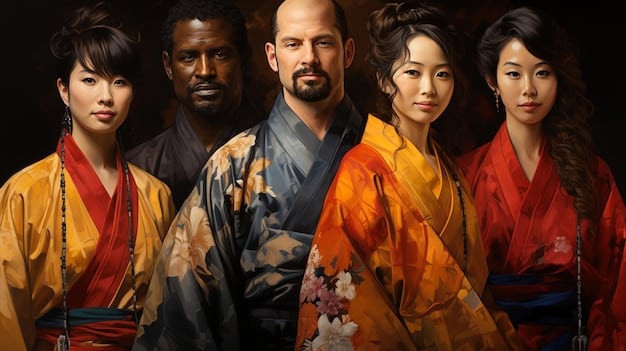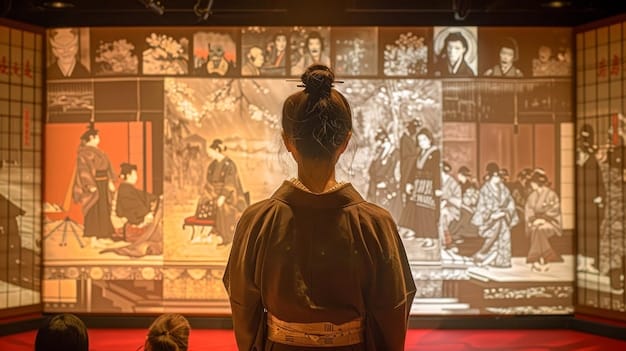Japanese Drama Actors: Beyond One-Hit Wonders in J-Dramas

Advertisements
Japanese drama actors and actresses often gain recognition from a hit show, but many go on to have long, successful careers in various roles, showcasing their versatility and talent beyond a single performance.
The world of Japanese dramas, or J-dramas, is filled with captivating stories and talented actors. While some actors might be remembered for one iconic role, many continue to thrive in the industry, showcasing their versatility and dedication. Let’s explore the career paths of some notable Japanese drama actors and actresses: Following Their Careers Beyond One Hit Show.
Anúncios
Exploring the Initial Breakthroughs of J-Drama Actors
Many actors and actresses in the Japanese drama industry find their initial fame through a breakout role in a popular series. These roles often define their early careers and create a strong impression on the audience. Let’s delve into how these breakthroughs shape their subsequent paths.
The Impact of a Defining Role
A defining role can catapult an actor into the spotlight, opening doors to numerous opportunities. However, it also presents the challenge of overcoming typecasting and proving versatility.
Anúncios
Examples of Memorable Breakthrough Performances
Several actors and actresses have had breakthrough performances that etched their names into the hearts of viewers. These roles often become synonymous with their public image.
- Yui Aragaki in “Dragon Zakura”: Her role as a high school student helped her gain recognition and launch an impressive career.
- Takuya Kimura in “Love Generation”: His charismatic portrayal of a passionate creative solidified his status as a leading man.
- Masami Nagasawa in “Proposal Daisakusen”: This role highlighted her acting skills and appeal, setting the stage for future success.
These initial roles often serve as a foundation for their careers, providing a platform to explore diverse characters and genres.
The initial breakthrough is just the beginning. The choices they make afterward define their longevity and influence in the industry.
Transitioning From Teen Roles to Mature Characters
For many Japanese drama actors and actresses, their careers begin with roles portraying teenagers or young adults. As they mature, the transition to more complex and mature characters becomes a critical point in their career trajectory. How do they navigate this transition?
The Challenges of Aging in the Industry
The entertainment industry can be particularly challenging when it comes to aging. Actors need to adapt their image and skills to stay relevant and avoid being pigeonholed.
Successfully Embracing New Roles
Some actors successfully embrace new roles that reflect their age and experience, proving their adaptability and range. These transitions can be pivotal for maintaining a long-term career.
Transitioning from youthful roles requires a willingness to evolve and take on characters that align with their age and experience.

Exploring Roles in Different Genres
One key aspect of a sustainable career in Japanese dramas is the ability to transition between different genres. Actors who can convincingly portray characters in various settings often enjoy longer and more fulfilling careers. Let’s examine this versatility.
The Importance of Versatility
Versatility is highly valued in the entertainment industry. Actors who can navigate different genres showcase their talent and creativity, attracting diverse audiences and opportunities.
Examples of Actors Who Excel in Multiple Genres
Certain actors have proven their ability to thrive in various genres, earning acclaim for their flexibility and skilled performances.
- Kenichi Matsuyama: Known for his roles in both serious dramas and comedic series, he demonstrates a remarkable range.
- Haruka Ayase: She has starred in everything from historical dramas to romantic comedies, showcasing her adaptability.
- Junichi Okada: Balancing action roles with introspective character studies, he impresses with his broad capabilities.
These actors benefit from showing range. That range translates to more varied and interesting roles.
Transitioning between genres not only keeps things interesting for the actors but also for the audience, maintaining a fresh and engaging career.
Venturing into Film and Stage Productions
While Japanese dramas offer a consistent platform for actors, branching out into film and stage productions can provide new artistic challenges and opportunities. Many actors and actresses expand their careers in this way.
The Differences Between Drama, Film, and Stage Acting
Each medium presents different demands and rewards for actors. Film allows for nuanced performances captured on camera, while stage requires a powerful presence and immediate connection with the audience.
Notable Transitions and Performances
Some actors have successfully transitioned between dramas, films, and stage, earning accolades for their performances in each medium.
Exploring different acting platforms can broaden an actor's skill set and introduce them to new audiences, enhancing their overall career.

Balancing Fame with Personal Life
Achieving fame through Japanese dramas can bring significant attention to an actor’s personal life. Balancing public image with personal privacy becomes a crucial aspect of managing a successful and sustainable career. How do actors navigate this challenging landscape?
The Pressures of Public Scrutiny
Public scrutiny can be intense, and actors often need to manage their image carefully to avoid negative publicity. Maintaining a balance between fame and privacy is key to long-term well-being.
Strategies for Maintaining Privacy
Some actors adopt strategies such as selectively engaging with the media, focusing on their work, and maintaining a close circle of trusted friends and family.
Balancing fame with personal life is a crucial aspect of maintaining a sustainable and fulfilling career, allowing actors to remain grounded and focused on their craft.
The Role of Social Media in Career Longevity
In today’s digital age, social media plays a significant role in how actors connect with their fans and manage their public image. Utilizing platforms like Twitter, Instagram, and blogs can significantly impact their career longevity.
Building a Personal Brand Online
Social media allows actors to connect directly with their audience, sharing insights into their work, personal interests, and values. This direct engagement helps build a personal brand that resonates with fans.
Engaging with Fans and Promoting Projects
Actors can use social media to promote their latest projects, share behind-the-scenes content, and engage in conversations with fans. This interaction fosters a sense of community and keeps fans invested in their careers.
- Active Engagement: Replying to comments, hosting Q&A sessions, and participating in online discussions.
- Content Creation: Sharing interesting and relevant content that reflects their personality and interests.
- Strategic Promotion: Announcing new projects and sharing updates in a manner that excites and informs their audience.
Social media is a powerful tool for actors to shape their narrative and engage with their fanbase.
Leveraging social media effectively can significantly enhance an actor’s career, creating a lasting connection with their audience and driving engagement with their work.
Future Trends and Opportunities for J-Drama Actors
The world of Japanese dramas is constantly evolving, with new trends and opportunities emerging. Understanding these trends and adapting to them can help actors and actresses maintain relevance and impact in the industry.
The Rise of Streaming Platforms
Streaming platforms have revolutionized the way content is consumed, creating new avenues for J-dramas to reach global audiences. Actors who embrace these platforms can broaden their reach and gain international recognition.
Collaborations and International Projects
Collaborations between Japanese and international production companies are becoming increasingly common, offering actors the chance to work on global projects. Embracing these opportunities can lead to exciting career advancements.
As the entertainment industry evolves, the key to longevity will be adaptability, innovation, and a willingness to embrace new opportunities. These all contribute to keeping actors fresh and interesting.
The future of J-drama actors looks promising, with ample opportunities for growth, collaboration, and innovation on both local and international stages. Those who embrace these trends will continue to thrive in the ever-evolving entertainment landscape.
| Key Point | Brief Description |
|---|---|
| 🌟 Breakthrough Roles | Initial fame often comes from a standout performance. |
| 🎭 Genre Versatility | The ability to perform in different genres extends careers. |
| 🎬 Film & Stage | Branching out enhances skills and broadens the audience. |
| 📱 Social Media | Connecting with fans online builds a strong personal brand. |
Frequently Asked Questions
▼
Many J-drama actors transition by taking on roles that reflect their age and experience. This often involves accepting more mature characters and adapting their image to suit these new roles.
▼
Genre versatility demonstrates an actor’s range and talent, attracting a wider audience. It prevents actors from being strictly typecast, allowing them to continuously evolve their career.
▼
J-drama actors use platforms like Twitter and Instagram to connect with fans, promote projects, and build their personal brand. This interaction helps maintain a strong, engaged fanbase.
▼
J-drama actors often face intense public scrutiny, requiring them to carefully manage their image and privacy. Balancing fame with personal life is crucial for their well-being and career longevity.
▼
Streaming platforms have broadened the reach of J-dramas globally, creating new opportunities for actors. They can now access international audiences and collaborate on projects with global production companies.
Conclusion
In conclusion, the journeys of Japanese drama actors and actresses are marked by versatility, adaptability, and a constant evolution to stay relevant in a dynamic industry. From memorable breakthrough roles to embracing mature characters, venturing into different genres, and leveraging social media, these actors pave their way to successful and impactful careers.





